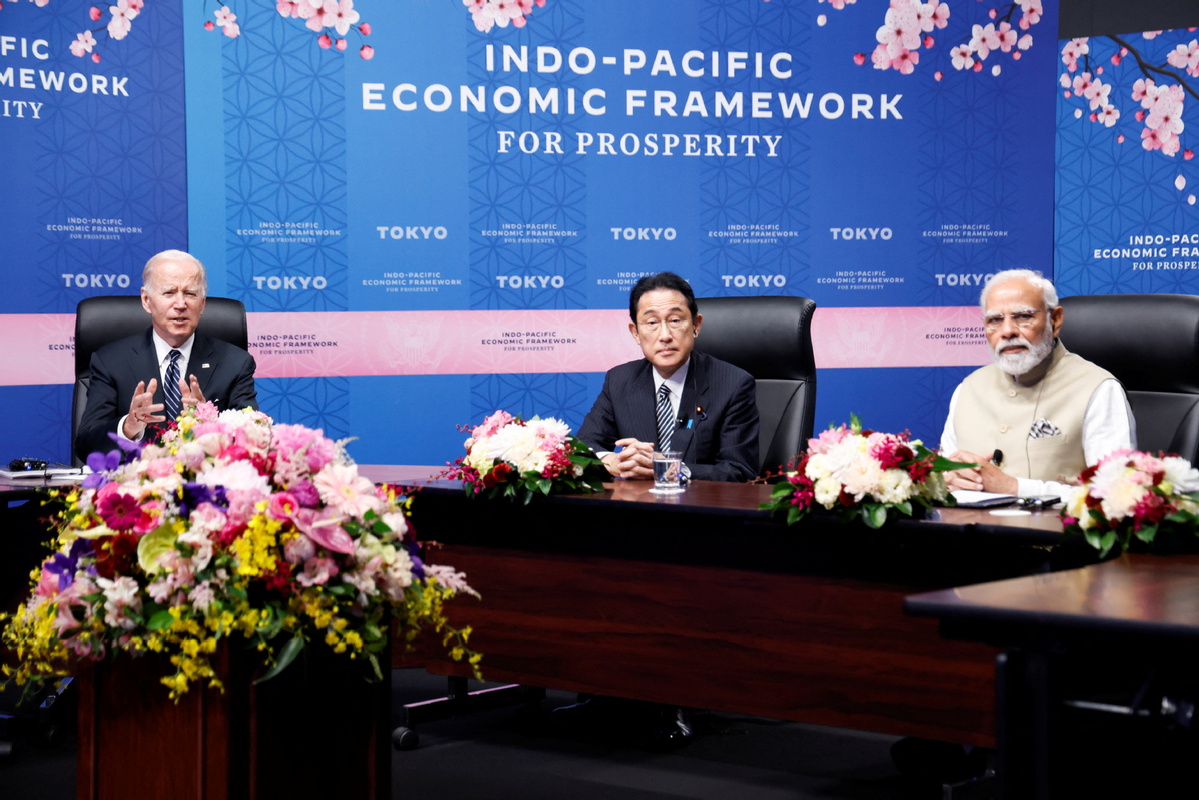IPEF viewed as effort to box in China
By YIFAN XU in Washington | China Daily | Updated: 2022-05-27 09:58
Asia trade comes across as secondary goal for US-led initiative, forum hears

The objectives of the so-called Indo-Pacific Economic Framework, or IPEF, seem less about being conducive to trade in the region as they appear to be about restricting China's sphere of economic influence.
That was the consensus emerging at a recent webinar themed "Indo-Pacific Economic Framework: New Model of Regional Trade Liberalization or One-Time Aberration", hosted by the Institute for China-America Studies.
Panelists at the event wondered whether the IPEF is aimed at further decoupling US and Asian supply chains from China-centric ones.
From Beijing's perspective, the framework understandably raises concerns about Washington's intentions, especially so at a time when there has been scant bilateral engagement on the economic and trade fronts, experts said.
"It should be underscored that China is the world's largest trading partner of every potential IPEF member," said Craig Allen, the president of the US-China Business Council. He said that China had applied to join the Comprehensive and Progressive Agreement for Trans-Pacific Partnership, or CPTPP, which "has done a lot to improve regional integration within the Asia-Pacific region".
Allen said the IPEF is "not offering more reciprocal market access".Rather, "it's really a focus on trade defensive measures that would be export controls, import screening, secure supply chains and other defensive measures", he said.
He also said the framework may be "an awkward fit" with existing economic and trade agreements in the region, such as the Asia-Pacific Economic Cooperation.
US President Joe Biden announced the IPEF on Monday in Tokyo, with the US' Asian partners Australia, Japan and South Korea. According to Biden, it is a broad plan designed to help expand the "economic leadership "of the US in the region.
Facing political pressure from both Democrats and Republicans in the US Congress to avoid free-trade deals, the White House stressed that the IPEF is not a free-trade agreement.
Mary Lovely, a senior fellow at the Peterson Institute for International Economics, said during the webinar that none of the IPEF structures would be embedded into existing structures in the region, so it is unclear how they could function with those treaties.
Lovely said that the divisions in US domestic politics might affect the credibility and role of the IPEF, as exemplified by the US withdrawal from the Trans-Pacific Partnership, the forerunner to the CPTPP.
"We see continuing, in some sense, disagreement and even disarray in terms of what the Asian strategy is," she added.
From the perspective of members or potential members of the IPEF, Lovely said that if the US asked them to choose a side between the US and China, it would have a negative effect, alienating some of those countries from the US because of China's "magnitude and importance".
"The US is trying to shape the environment around China, but it's doing it in a way that is indicative of US domestic politics and the difficulty of getting a clear strategy that would allow the US to actually lead," Lovely said.
Denis Simon, a professor of China business at Duke University, said that it will be hard for Beijing to trust the IPEF in light of "the Senate's Innovation and Competition Act and its counterpart in the House, and… a rather broad range of anti-China initiatives regarding investment, export controls, technology transfer (and) semiconductor policy that keep creeping into the mainstream of public policy in the United States".
'Thinly veiled'
"Many experts have said that Biden's IPEF strategy is no more than a thinly veiled effort to counter China in the Asia-Pacific region. And I think there's some substance to that," Simon said.
He stressed that it is not beneficial to the US to marginalize China.
"If you're talking about multilateralism and talking about, you know, integrated trade regimes, how can the exclusion of China help to place the global and regional trade system on a more stable integrated path?" Simon said.
Simon said he is concerned that the current level of engagement between the US and China is becoming very limited.
"We need to understand where this is all headed, because what's happening is that we may be driving off a cliff, and we're getting closer and closer to the edge, and we won't realize it until it's too late," Simon noted.
Allen said: "China is so large and so important, and the lack of dialogue we are facing right now is really deleterious and is leading to isolation, actually for both the United States and China."























